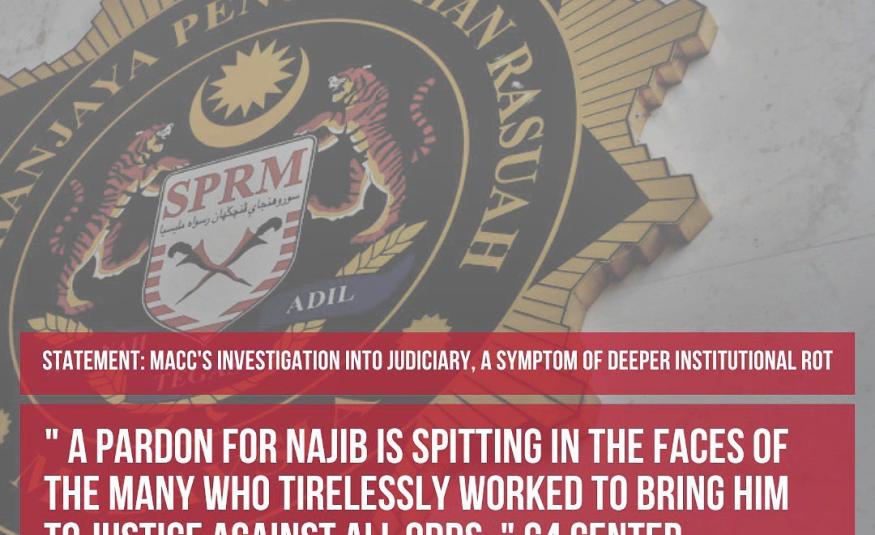DURING a Dewan Rakyat sitting on 6 April 2023, Minister in the Prime Minister’s Department (Law and Institutional Reforms) Azalina Othman revealed that the Malaysian Anti-Corruption Commission (MACC)’s investigations into Justice Nazlan Ghazali had found that he violated the Judges’ Code of Ethics when he presided over the controversial SRC International case.
According to the MACC, Justice Nazlan, who handed former Prime Minister Najib Razak a 12-year prison sentence, was involved in conflict of interest.
The Center to Combat Corruption and Cronyism (C4 Center) strongly objects to the MACC’s overreach, and reminds politicians that the guilt of corrupt individuals as proven in a court of law is not a matter to be politicised.
The MACC’s current jurisdiction and powers are afforded to them through the MACC Act – there exists no stipulations in the Act that would allow them to overstep into deciding whether or not a judge has violated the Judges’ Code of Ethics, an issue that remains within the judiciary’s purview.
As an Executive body under the supervision of the Prime Minister’s Department, this action sets off alarm bells of Executive interference into the Judiciary.
The Bar Council and prominent lawyers have pointed out that this is an attempt by the MACC to intimidate the Judiciary. If the MACC continues to stand by these findings and not retract them or issue an official rectification, this would set a dangerous precedent in allowing the Executive to undermine the Judiciary.
In positioning themselves as being able to decide on matters of Judges’ ethical conduct in a public setting, the MACC could inadvertently erode public trust in the judicial system. This is especially dangerous considering that corrupt politicians by-and-large have been able to escape legal scrutiny owing to the gaps in existing institutions – throwing doubt on such a major decision would hamper subsequent efforts to bring corrupt individuals to justice.
Even within the current context, it needs to be said that the MACC should not be an arm of the Executive to begin with. The criticism of the MACC’s lack of independence has been a longstanding one, with concerns directed at this presenting the risk of the MACC’s work being politicised or serving political ends.
Crucially, public trust is not solely reserved for specific state institutions and not others – in order for the MACC to be able to perform its duties to the best of their abilities, issues that potentially detract from their work must be resolved.
Hence, it is in the MACC’s best interests that their functions and structure are in line with principles of independence, transparency, and the separation of powers.
However, the issue of politicking extends beyond the realm of the MACC.
On 12 April, it was reported that the Bersatu Youth had lodged a police report against the MACC, alleging that they had acted out of bounds and violated the MACC Act.
While these claims are valid at face value, it is abundantly clear that Bersatu Youth is attempting to politicise this situation to their benefit, either in publicly aligning themselves in opposition of Najib’s corruption, or in attempting to discredit the MACC in the midst of an ongoing investigation against Bersatu for their misappropriation of COVID-19 aid funds.
This is not unique to Bersatu as UMNO was reportedly explicitly involved in the process of trying to secure Najib’s royal pardon, notwithstanding that he still faces further impending trials for his corruption.
Najib’s trial has become the avenue by which political parties attempt to smuggle their own goals and self-interests, instead of treating it like a major stain on Malaysia’s history.
Najib Razak’s conviction was the culmination of the work of many individuals, activists, and organisations who gathered evidence, conducted investigations, and faced intimidation by the police over the course of many years when he was still Prime Minister.
Malaysians turned out and demonstrated in the largest protests in the history of the nation and voted in record numbers during the 14th General Elections in 2018. Investigations into the 1MDB scandal spanned continents across many nations, some still ongoing to this day.
Our politicians need to contend with the fact that Malaysia has undergone massive strides in the direction of rejecting corruption – a cornerstone of the current unity government’s agenda is one of strong anti-corruption – and this is reflective of Malaysians’ attitudes in desiring to see change in our political and societal culture.
The MACC and judiciary are both key institutions in the fight against corruption and must never be manipulated and used as tools to meet political agendas and must be held to the highest standards of conduct, guided by established principles.
However, it must be said that in order for the MACC to be able to be a reliable and trusted institution, the current has to be sufficiently resolved, as well as its other outstanding controversies.
Hence, C4 Center makes the following calls:
A royal commission must be set up composed of independent individuals and civil society members to investigate why the MACC had overstepped its boundaries in investigating Justice Nazlan.
The Royal Commission will also need to be given the mandate to investigate all other serious controversies surrounding the MACC including the unresolved corporate share ownership issue involving the Chief Commissioner, various accusations of political persecution as claimed by politicians that the MACC was alleged to have been spearheading when Perikatan Nasional was in power. There is a serious trust and credibility issue surrounding the MACC and this can only be overcome if proper and independent investigations are carried out to find out the truth.
The political opportunism surrounding Najib’s case as well as the propaganda efforts to secure him a royal pardon must be halted. Parties and politicians must remember that the crimes Najib committed – heard and tried in the highest court of law – were not the result of poor judgement that would necessitate any mercy, but rather a calculated and sustained web of deceit that led to the impoverishment and degradation of incalculable Malaysian lives. His deeds have left a deep wound in the nation – a pardon for Najib is spit in the faces of the many who tirelessly worked to bring him to justice against all odds.
Issued by:
Center to Combat Corruption & Cronyism (C4 Center)










